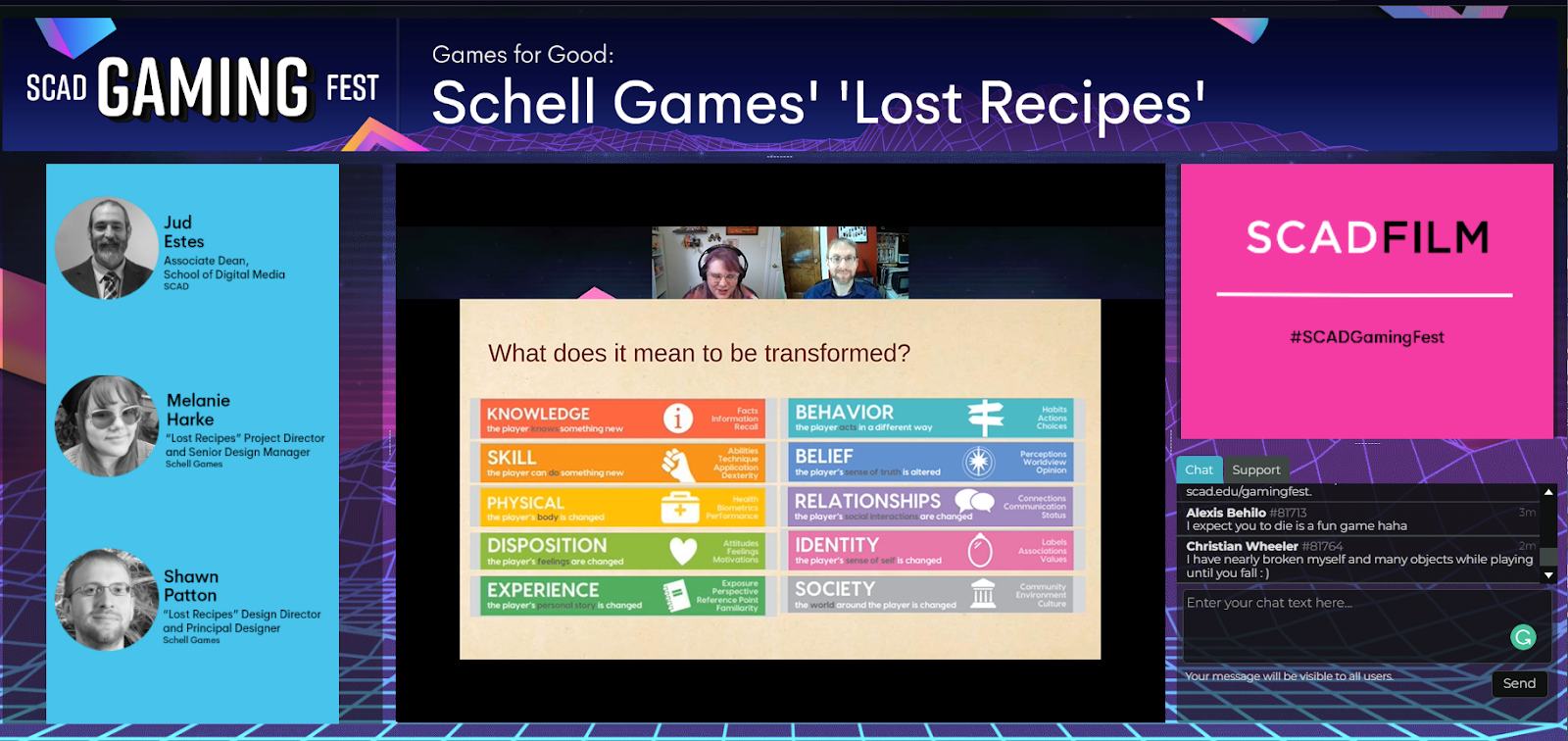Gaming Fest – Schell Games’ “Lost Recipes”
During this week’s SCAD Gaming Fest, two game designers from Schell games came to talk about their new VR game, “Lost Recipes.” Melanie Harke: “Lost Recipes” Project Director and Senior Design Manager and Shawn Patton: “Lost Recipes” Design Director and Principal Designer talk about the process of the game. This cooking game is unlike other cooking games where you rush to complete tasks for points. Instead, this is an immersive experience where you can relax and learn how to cook culturally and historically accurate foods from around the world.
This type of game is called a transformational game. But what does that type of game mean? A transformational game is one where it intentionally changes someone in real life. The top ten pillars for transformation are these:
- Knowledge
- Skill
- Physical
- Disposition
- Experience
- Behavior
- Belief
- Relationships
- Identity
- Society
When creating these types of games, game developers need to ask themselves some questions first. Here are the questions that the game developers at Schell Games ask themselves:
- What is your high level purpose?
- Who are you making this game for?
- How will the players be transformed?
- What are the barriers to this transformation?
- What are the key concepts of this transformation?
- Who knows what you don’t know? (Domain Experts)
- What are the prior works?
- How will you measure the impact your game has?
There is a framework called the “Transformational Framework” that Sabrina Culyba developed while she worked at Schell Games. It is free for anyone to use because their ideology is that they want to see people create more immersive and educational games.
The information can be found here: https://www.transformationalframework.com/
While developing the game “Lost Recipes,” they came up with the idea of the player being a “culinary tourist.” The game’s goal would be to walk away feeling like you had a cultural cooking experience while preparing other cultures’ foods. To begin their process of creating this game, they had to start with a research phase. During this research phase, they needed to hone down on the specifics of the game. Cooking is a very broad topic, and they needed to make sure it was educational. To do so, they came up with the idea of the player being able to cook in three different historical kitchens: Ancient Greece, Song Dynasty China, and Columbian Exchange Yucatan Peninsula. The people who helped them with their research were Clair Schuler (Greece), Gang Liu(China), and Owen Jones(Maya). For game developers, it’s important to work with experts, so you get accurate information.
That brings us to the next topic of authenticity. Schell games wanted to make their game authentic, to make sure that it would be educational. There is also the fact that people can spot a “phony.” And by having something be authentic, it would be an experience for the player. A part that added to the game’s authenticity was finding voice actors for each region of the game. These voice actors were from those specific regions, and each of them spoke the native language of that region where the player would cook the food.
During the playtesting phase of the game, it is important to find people who are naive to the idea of the game. And even more important to see how they act and question them afterward. Essential questions to ask playtesters are:
- What was the most frustrating thing about the game?
- What was your most favorite?
- Was there something you wanted to do but couldn’t?
This last question is very important, particularly to VR games. If a player, for example, reaches for an object but they can’t pick it up, it takes away from being immersed in the game and brings you back to reality. During the playtesting phase of “Lost Recipes,” Shawn mentioned that at a certain part, playtesters would get so into the game as though they were in a real kitchen. During a specific part where the player needs to make a marinade, one of the playtesters had the marinade bowl in their hand and was looking around to see where they could pour it in their kitchen. Because of this, the game designers added an extra bowl for the player to keep their kitchen clean and pour the marinade in. Once the extra bowl was put in, the players would see that they could use it and keep their kitchen tidy and clean.
During the end of the presentation, a question was asked if there was anything specific about game design that current students in the field may not know:
To this question, Shawn responded:
“Game design is way harder than you think it is, but it is also extremely rewarding when you see someone playing your game and having fun. There will be times when things seem crazy or lost, but stick with it because it is extremely rewarding to see something you helped create bring joy to someone else.”
“Lost Recipes” is a cooking game meant for relaxation and an immersed learning experience. The game’s art style is unique, and its slow-paced cooking won’t have you feeling rushed. The game is currently out on Oculus and can be bought for only $15. You can buy the game here: https://www.oculus.com/experiences/quest/4584847304916084/
For more information about the game go here: https://lostrecipes.schellgames.com/
For information about applying to jobs at Schell Games, Melanie posted this link: https://www.schellgames.com/careers
